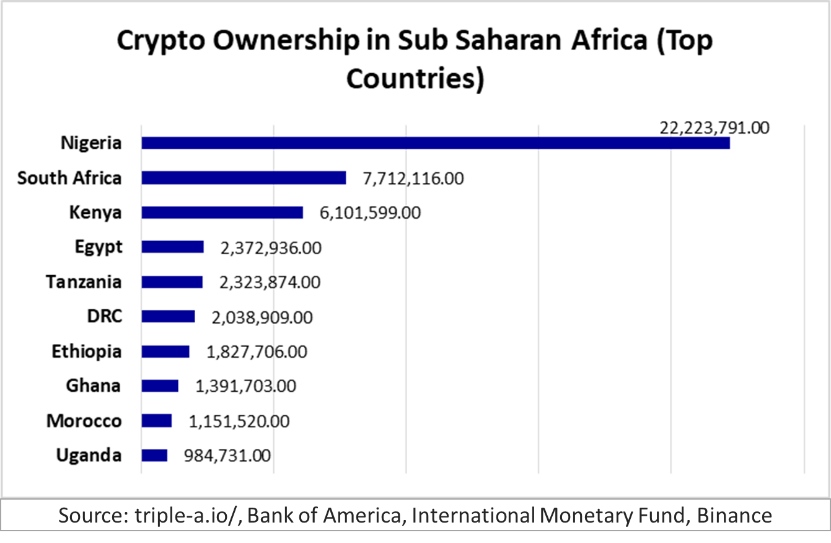Ghana and the global crypto regulation race
Hans-Günther Franz, Frankfurt-am-Main, Germany
April 05, 2024
P ersistent Inflation, loss of purchasing power and recurrent currency depreciation are the principal reasons consumers in Sub-Saharan Africa are showing an interest in crypto currency. A common perception is that this new medium of exchange will become an alternative to the domestic currency, but without the uncertainties associated with Africa’s volatile economies. A crypto currency is therefore, a potential palliative to the prevalent rigid monetary systems that exclude millions from the financial system in Sub-Saharan Africa.
Also, cryptocurrencies are attractive because they contribute to the transformation and accessibility of money transfer. Crypto remittances settle instantly, while circumventing inter-bank payments processing. These blockchain-based transfers reduce cost by eliminating the charges deducted by banks, software providers, and agents1.
But, cryptocurrencies carry embedded systeminc and non-systemic risks. Regulators in Sub-Saharan Africa have warned against the potential use of crypto currency for tax evasion, money laundering and criminal financing activities. They also cautioned users about personal risks stemming from cybercrimes. In addition, environmental groups are beginning to highlight the contribution of blockchain technologies to green house emissions. This is because computers and data centers use fossils energy2. Finally, the adoption of crypto currencies in Sub Saharan Africa depends on the presence of basic infrastructure such as reliable electricity, affordable internet, inter-operable mobile networks and safe digital data centers.
Countries in West and Central Africa for example are still grappling with these essential infrastructure pre-requisites. Ghana, Nigeria and of the Central African Republic illustrate the uncertainties, challenges and opportunities associated with the adoption of this new type of currency in Sub-Saharan Africa.
Experiences of Ghana, Nigeria and The Central African Republic
Ghana
Like the majority of countries in Sub-Saharan Africa, the crypto industry does not have verifiable or independently audited data on the users of, or investors in, crypto currency in Ghana. Despite the dearth of data, the crypto currency exchange, Binance, cites Ghana as an example of ‟grassroots adoption of crypto currency”3. Like Binance, major exchange plateforms advertise the possibility of opening an online crypto trading account in Ghana Cedi. But they do not have a physical presence in the country, making it impossible for financial regulators to collect data on users.
Regulators in Ghana have warned against the use of crypro currency in the country. In February 2018, the Bank of Ghana (BoG) announced that activities in digital currency cannot operate in the country as licensed business under the country's Payments System Act 2003 (Act 662). A year later, in March 2019, the Ghana Security Exchange Commission (SEC) doubled down. In a notice, the SEC informed the public that crypto currencies are not a legal currency or tender in Ghana. In addition, the SEC warned that crypto trading platforms are neither licensed nor regulated by the SEC.
In a subsequent development, the Central Bank of Ghana launched a pilot study of the E-Cedi in September 2021. During the launch of the pilot project, the bank’s governor appeared to signal openess to a form of blockchain-based money. He acknowleged that blockchain technology can pave the way for financial inclusion and a rapid transformation of the payment system.
Giesecke+Devrient (G+D) is the technical implementing company of the e-Cedi pilot project. G+D is a German company headquartered in Munich that provides banknotes and securities printing, smart cards, and cash handling systems.
Binance in Ghana

Nigeria
The year 2024 began with a storm as the Central Bank of Nigeria (CBN) announced a ‟clamp down on Binance and other amorphous international currency manipulators and money launderers”4. During the March meeting of the monetary policy committee, the CBN said that Binance and other crypto platforms5 were involved in ‟arbitrary fixation of foreign exchange rates” 6. Nigerian authorities explained that untraceable funds worth US$26 billion flowed through Binance, and then, out of Nigeria in 2023. These illicit transactions, the banking regulator said, had fueled inflation and contributed to a 70 percent depreciation of the Naira against the USD. On March 4th, 2024, Binance reported that Nigeria asked the exchange to pay at least US$10 billion in compensation after the arrest of executives of a local entity allegedly linked to Binance7.
In May 2024, the Federal government of Nigeria announced additional measures to combat ‟illegal trading in digital assets”. The authorities want to ensure that those dealing in such instruments are registered with the Nigeria Securities and Exchange Commission (SEC). Also, on May 06, 2024 during a meeting with associations representing blockchain stakeholders in Nigeria, the head of the SEC, Emomotimi Agama, indicated that the regulator wants to see the Naira delisted from peer-2-peer (P2P) trading to avoid manipulation.
In a reverse move, the Central Bank of Nigeria published new guidelines on December 22, 20238 which led to a lifting of the ban on crypto currency trading. But, Binance suspended transactions and trading in Naira In March 2024.
Central African Republic
The Central African Republic (CAR) went a step further. In July 2022, CAR announced the launch of a national crypto coin called ‟Sango Coin”, described as a ‟national digital currency”. The Sango Coin was supposed to serve as a legal tender alongside the regional currency the CFA (XAF). However, CAR eventually postponed plans after reluctance from the regional central bank, the Central Bank of Central Africa (BEAC), which is also considering a regional Central Bank Digital Currencies (CBDCs).
Interest in Crypto not waning, despite bad news
Blockchain associations are springing up across Africa. Notable blockchain associations in Sub-Saharan Africa include the ‟Blockchain Association of Kenya (BAK)”, ‟Blockchain Nigeria User Group (BNUG)” and the ‟Blockchain Society Ghana”. Michael Kimani, a blockchain enthusiat, launched the Blockchain Association of Kenya (BAK) in 2017. In Southern Africa, prominent associations include the ‟South African Digital Asset & Blockchain Association (SADABA)” and the ‟Blockchain Namibia Association”. These associations claim to provide education and purport to promote the adoption of blockchain technology.
Once a year, an event organizer called the ‟African Bitcoin Conference”9 hosts the ‟Afro bitcoin fellowship” and the ‟Africa Bitcoin Day”. The conference claims to be working to promote a movement for crypto currency adoption across Africa. On December 1st-3, 2022, Accra hosted the African Bitcoin Conference. Participants at the events confirmed to the New Economy Ghana that Binance P2P, Paxful, Yellow Card, Kraken, Coinbase offer conversion of Ghana Cedi (crypto) into Crypto (Ghana Cedi) when and if trade is possible.
According to a 2023 survey by technology firm, ‟Triple-A.io‟, ownership is modestly increasing in Sub-Saharan Africa. Before the ban, Nigeria held the largest amount of cryptocurrency in value terms. The West African country was followed by South Africa and Kenya.
The Iinternational Monetary Fund (IMF) also acknowledged that Africa is a fast-growing crypto market. But, citing Chainalysis, the IMF says that Africa remains the smallest market, with crypto transactions peaking at US$20 billion per month in mid-2021. Kenya, Nigeria, and South Africa have the highest number of users in the region10.

Developments outside of Africa
Outside of Africa, over 100 countries are exploring or piloting Central Bank Digital Currencies (CBDCs), which is a digital form of a country’s sovereign currency. Major international banks have started crypto trading activities. In March 2021, US investment bank, Morgan Stanley launched Bitcoin funds. After the announcement, Tesla, and SpaceX CEO Elon Musk, acquired the equivalent of US$1.5 billion in Bitcoin, then signaled plans to accept it as payment. On September 7th, 2021, and despite warning from the International Monetary Fund (IMF) El Salvador, passed a law, which made the digital currency Bitcoin legal tender within the country11.
USA
On March 9th, 2022, President Joe Biden issued an executive order that aims to co-ordinate the US government’s regulations of digital assets12. The White House said that digital assets, including crypto currencies, surpassed US$3 trillion market cap in November 2022 (up from US$14 billion just five years prior). It also revealed that 16 percent of adult Americans (40 million people) have invested in, traded, or used crypto currencies.
On June 5th, 2023, the US Securities and Exchange Commission (SEC) filed 13 charges against entities of Binance, the world’s biggest crypto currency exchange and founder Changpeng Zhao. According to statements from the SEC, charges included operating unregistered exchanges, broker-dealers, and clearing agencies. Binance founder also faced charges of misrepresenting trading controls and weak internal oversight on ‟Binance.us” platform and unregistered offer and sale of securities.
However, on June 18th, 2023, Binance and the US SEC settled the case to avoid a full asset freeze of the platform. Binance agreed to keep customer assets in the United States during the investigations. To complete the catalogue of negative news for the crypto world, Bitcoin, the largest crypto currency, lost two-thirds of its value, after the COVID-19 pandemic. According to the IMF, Bitcoin is synonymous with volatility as its prices continue to swing over brief intervals of time. The year 2023 ended with the conviction of Sam Bankman-Fried for fraud related to the collapse of crypto currency exchange FTX13.
European Union
In Europe, the European Parliament adopted the Markets in Crypto assets (MiCA) regulation on April 20th, 2023. This Directive will govern services related to crypto assets and stablecoins.
China
In June 2021, the Chinese government banned the mining of crypto currencies. China subsequently banned crypto transactions and declared them illegal in September 2021.
Related Articles
BIBLIOGRAPHY
1❩ https://www.emerald.com/insight/content/doi/10.1108/JEAS-09-2022-0215/full/html
2❩ https://www.binance.com/en/square/post/1172950, Sep 19, 2023.
3❩ United Nations (2023): UN Study Reveals the Hidden Environmental Impacts of Bitcoin: Carbon is Not the Only Harmful By-product - https://unu.edu/press-release/un-study-reveals-hidden-environmental-impacts-bitcoin-carbon-not-only-harmful-product
4❩ Central Bank of Nigeria (2024): Personal statements by the monetary policy committee members MPC meeting March 25-26, 2024- https://www.cbn.gov.ng/Out/2024/CCD/PERSONAL percent20STATEMENTS percent20OF percent20MPC percent20MEMBERS percent20MARCH percent202024 percent20MEETING.pdf
5❩ Forextime, OctaFX, Crypto, FXTM, Coinbase, Kraken
6❩ Binance (2024): "Who is worth 10 billion US dollars?" One article to understand the Binance vs. Nigeria own incident - https://www.binance.com/en/square/post/4942021809106
7❩ Binance ibid
8❩ CNB (2023): Circular to all banks and other financial institution (Guidelines on operations of bank accounts for vitrual assets service providers (VASPs)) - https://www.cbn.gov.ng/Out/2024/FPRD/GUIDELINES%20ON%20OPERATIONS%20OF%20BANK%20ACCOUNTS%20FOR%20VIRTUAL%20Asset%20Providers.pdf
9❩ https://afrobitcoin.org/
10❩ IMF (2022): Habtamu Fuje, Saad Quayyum, Tebo Molosiwa - https://www.imf.org/en/Blogs/Articles/2022/11/22/africas-growing-crypto-market-needs-better-regulations#:~:text=Africa percent20is percent20one percent20of percent20the,of percent20users percent20in percent20the percent20region.
11❩ https://blogs.imf.org/2021/07/26/cryptoassets-as-national-currency-a-step-too-far/
12❩ White House (2022): FACT SHEET: President Biden to Sign Executive Order on Ensuring Responsible Development of Digital Asset - shttps://www.whitehouse.gov/briefing-room/statements-releases/2022/03/09/fact-sheet-president-biden-to-sign-executive-order-on-ensuring-responsible-innovation-in-digital-assets/
13❩ US Department of Justice (2022): United States Attorney Announces Charges Against FTX Founder Samuel Bankman-Fried - https://www.justice.gov/usao-sdny/pr/united-states-attorney-announces-charges-against-ftx-founder-samuel-bankman-fried
